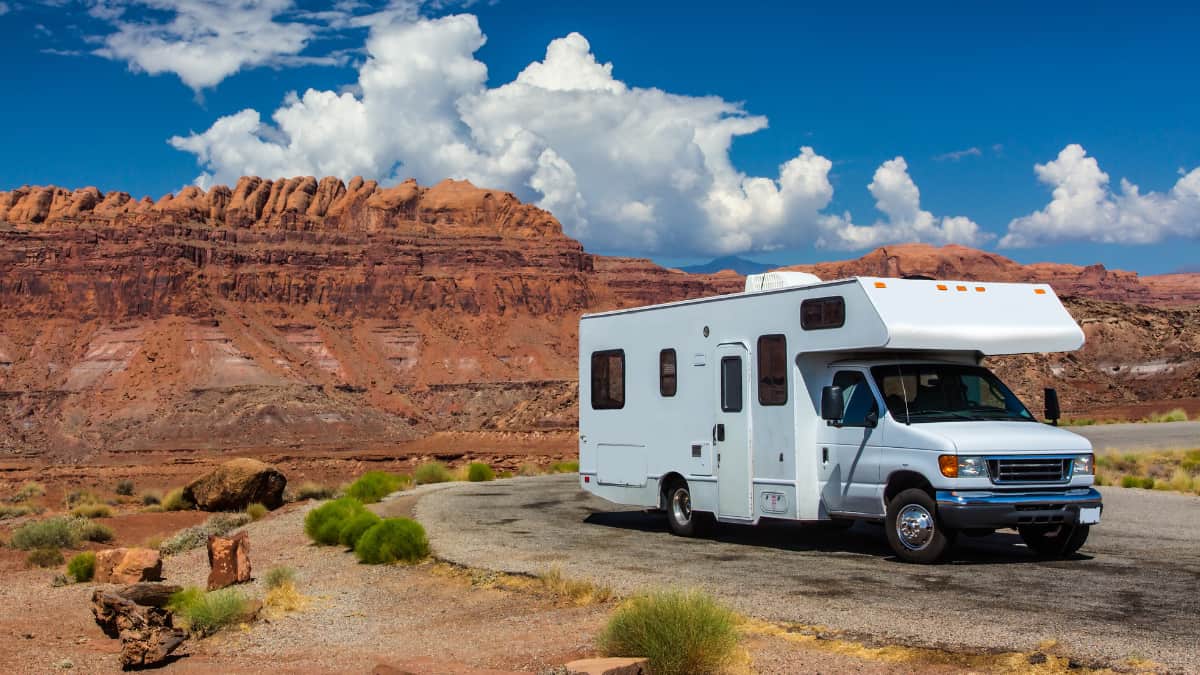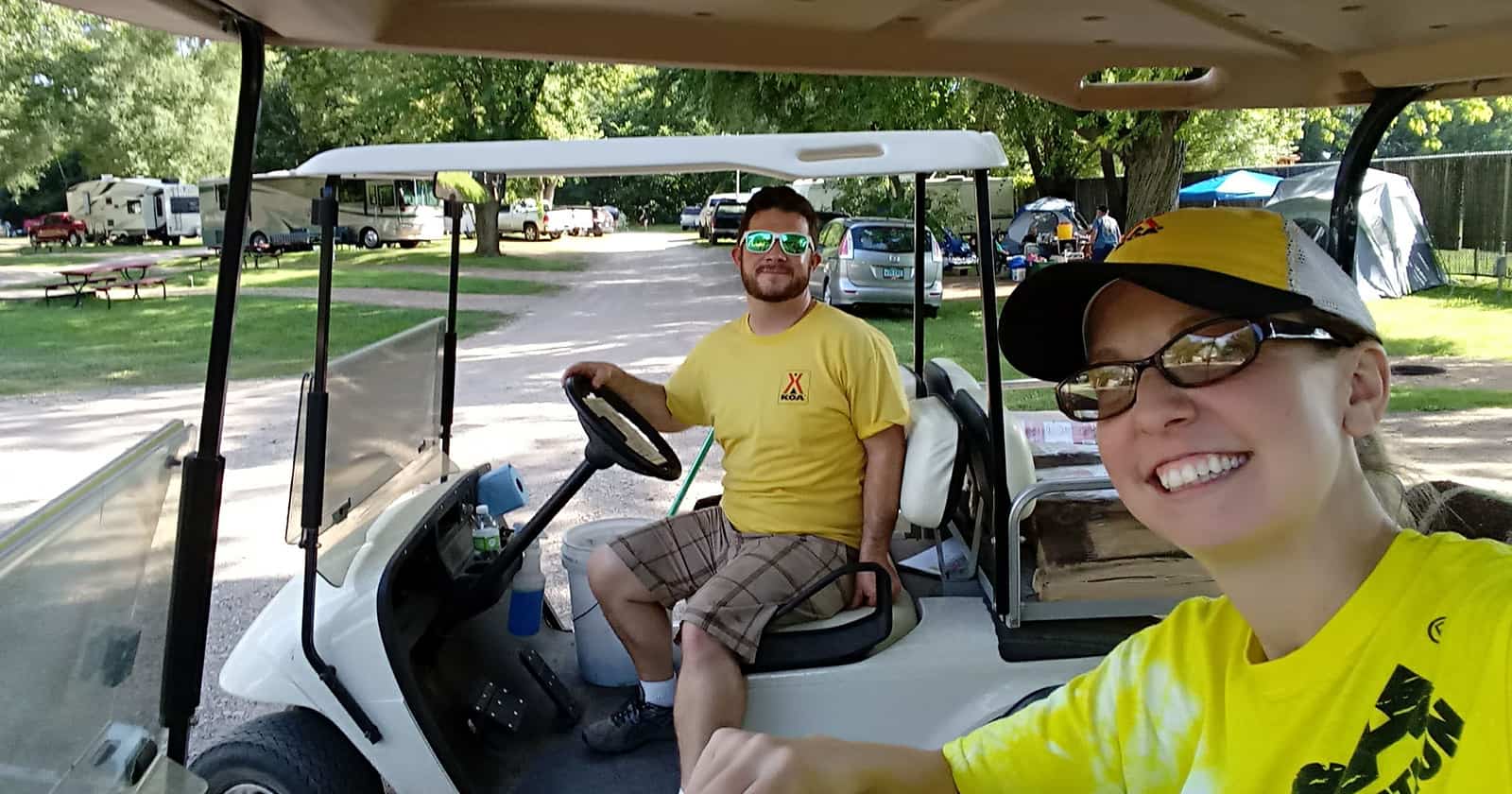Ever imagined turning the great outdoors into your office? That’s exactly what my wife, Natalie, and I did when we embarked on our workamping journey. Over a five-year span, we’ve lived and worked as camp hosts at five different campgrounds, along with many other seasonal workamping jobs.
While many think of camp hosting as a summer-only gig, our experience has shown us it’s a year-round adventure with peak opportunities between Memorial Day and Labor Day. We’ve experienced the spectrum of RV park sizes and vibes, from small, intimate settings to large resorts bustling with amenities. Our preference? The lively atmosphere and diverse experiences of the larger parks.
As camp hosts, we’ve tackled everything from light maintenance to customer service, learning that no two days are the same and every job brings its own set of challenges and rewards. Despite sometimes stepping into roles we knew little about, we found that openness to learning and adaptability were our greatest assets, aided by supportive park owners who valued effort and enthusiasm.
In this article, drawn from our insights and stories in our book Seasonal Workamping for a Living: How We Did It, we aim to shed light on the realities of camp host workamping. Whether you’re considering a shift to this lifestyle or just curious about what it entails, we’re here to share our adventures, lessons, and the undeniable appeal of living where you work.
Diving Into the World of Camp Hosting
What is Campground Host?
At the heart of the workamping universe lies camp hosting, a multifaceted role that combines the joy of RV living with the satisfaction of seasonal work. Camp hosting is where adventure meets responsibility, offering a unique blend of duties that range from maintenance tasks to customer service. Whether it’s keeping the campsites pristine, managing reservations, or ensuring the smooth operation of park facilities, camp hosts are the backbone of a campground’s daily life.
The Season for Workamping
While camp hosting opportunities exist year-round, the prime season kicks off between Memorial Day and Labor Day, when campgrounds and RV parks are at their busiest. This period offers the highest concentration of park host jobs, catering to the influx of vacationers seeking to explore the great outdoors.
Roles and Responsibilities
Beyond the Title – The Many Hats of a Camp Host
Camp hosting is far from a one-size-fits-all job. It’s a mosaic of roles that vary widely from park to park, encompassing everything from outdoor maintenance to office administration. Let’s break down these duties:
- Outdoor Maintenance: This includes the upkeep of campsites, landscaping, trash collection, cleaning restrooms, filling propane tanks, and escorting campers to their sites. Occasionally, campgrounds seek individuals with specialized skills like electrical work, plumbing, or carpentry, showcasing the diversity of tasks a camp host might undertake.
- Office Tasks: The other side of the coin involves administrative duties such as handling reservations, checking in guests, managing a clean and organized office, sorting mail, and addressing guest inquiries and concerns. Often, the office area doubles as a convenience store, adding retail operations to the camp host’s responsibilities.
The roles extend beyond these broad categories, reflecting the unique needs and scale of each campground. From housekeeping and store clerking to gate guarding, the job titles and responsibilities are as varied as the campgrounds themselves.
Skills and Training
A common concern for those considering camp hosting is the fear of not having the right skills. However, most campgrounds are prepared to train park staff in a variety of skills, emphasizing willingness to learn over prior experience.
My wife and I can attest to this, having stepped into roles that were entirely new to us. For instance, I found myself operating heavy machinery for road maintenance while my wife managed a tractor for waste disposal tasks—both roles we were initially unfamiliar with.
Such experiences underline the importance of openness and adaptability. Training is typically provided, and it’s understood that perfection isn’t expected right out of the gate. Communication with park owners is key; they have consistently been supportive when we’ve expressed any uncertainties about our tasks.
Hours, Compensation, and Perks
Finding the Right Fit
When it comes to being a camp host, flexibility is the name of the game—not just in the host assignments you may have but also in the hours you’ll work and the compensation you’ll receive. The variability in schedules can range from part-time commitments of 15-20 hours per week to full-time roles requiring 35-40 hours.
My wife and I have experienced a variety of setups, but one of our favorites was working three nine-hour days followed by three days off. This allowed us ample time to explore our surroundings, a major perk of the workamping lifestyle.
Compensation in camp hosting roles can also vary widely. Some positions, especially in state parks, offer volunteer opportunities which generally give full hookups and utilities in exchange for a set number of volunteer hours.
Paid positions, on the other hand, might offer an hourly wage, typically between $9 and $15 an hour, along with free or deeply discounted RV sites. It’s crucial to weigh these factors against your personal needs and preferences to find the right fit.
The Extras That Sweeten the Deal
Beyond the basics of hours and compensation, many campgrounds offer additional perks that can significantly enhance the workamping experience. These extras might include free or discounted access to campground amenities such as pools, golf courses, boat rentals, and more. Utilities and site costs are often part of the compensation package, with some parks going the extra mile by including free laundry services or discounted products from the campground store.
However, it’s important to read the fine print and fully understand what’s included in your compensation package. Not all deals are as sweet as they seem. For instance, a higher hourly wage might be offset by site and utility costs, effectively lowering your take-home pay. My wife and I learned early on to do the math and ensure that a position’s benefits truly aligned with our financial needs and lifestyle goals.
In our first workamping job at Desert Rose RV Park, we traded a minimum number of work hours for our site before any additional pay kicked in. The arrangement included free laundry and electricity, crucial perks during the hot Nevada summer.
By calculating the cost savings against the work required, we found the position to be financially advantageous for us. This underscores the importance of evaluating each opportunity not just on its face value but on how it fits into your broader workamping aspirations.
The Realities of Living Where You Work
Living and working in the same place offers a unique set of advantages and challenges. On the upside, the sense of community within campgrounds is unparalleled. There’s something profoundly rewarding about being part of a close-knit group, sharing experiences, and contributing to the collective enjoyment of the great outdoors. This communal aspect of camp life often leads to lasting friendships and memorable experiences that enrich the workamping lifestyle.
However, this proximity can also blur the lines between work and personal life, sometimes making privacy a scarce commodity. The visibility of living on-site means being accessible to guests and coworkers even during off hours, which can lead to unexpected interruptions and a feeling of never truly being “off duty.” My wife and I have experienced this firsthand, finding that even with a sign indicating we were off duty, we would still receive knocks on our RV door.
To counteract this, we’ve adopted strategies to maintain a healthy balance between our work responsibilities and personal time. One effective approach has been to make a conscious effort to leave the campground on our days off. This simple act of physically removing ourselves from the work environment has been crucial in mentally disconnecting from our roles as camp hosts, allowing us to recharge.
A Day in the Life of a Camp Host
Not every park works exactly the same way, and some have specialized job titles. For example, Natalie and I worked at the parks ice cream shop at Beth Page in Virginia. The below schedule is the most common mix of duties we have had at RV parks.
Morning:
- Office Kick-off: Natalie starts in the office, prepping for the day by opening up, checking the cash drawer, and reviewing the schedule for arrivals and departures. She ensures the store is ready for visitors, embodying the welcoming face of the campground.
- Maintenance Rounds: I hit the ground running with a golf cart, inspecting facilities and sites for overnight issues, tidying up communal areas, restroom cleaning, and performing quick maintenance checks to ensure everything’s in top shape for our guests.
Midday:
- Guest Management: Natalie handles check-ins, manages reservations, and fields inquiries, offering recommendations and ensuring every guest feels at home from the moment they arrive.
- On-the-go Repairs and Assistance: My focus shifts to specific maintenance tasks, responding to guest needs, and ensuring the campground remains pristine and welcoming. The variety keeps the job engaging and fulfilling.
Evening:
- Closing Time: Natalie wraps up in the office, recording sales and setting up for the next day.
- Final Sweep: I perform a last check of the campground, securing the area for the night before parking the golf cart and clocking out.
On some occasions, we have had to take a phone with us after closing time. This required us to be on call for a certain number of hours after leaving the office. Fortunately, we didn’t get many calls.
Finding Workamping Jobs
Securing a camp host position can seem daunting at first, but there are several reliable resources and communities that can make the search much easier. Here are some key platforms to help you find the right workamping opportunity.
Workamper News
Workamper News is a comprehensive resource for anyone interested in workamping. The site offers job listings, valuable advice, and resources to help you prepare for and find workamping jobs across the United States. It’s a subscription-based service, providing access to an extensive database of employers, educational materials, and forums where you can connect with other workampers.
Workampers Facebook Group
The Workampers Facebook Group is a vibrant community of like-minded individuals sharing their experiences, job postings, and tips about workamping. It’s an excellent place for real-time advice and support from those who are actively engaged in the lifestyle. The group is a valuable resource for both newcomers and seasoned workampers looking to exchange information and find job opportunities.
Tips for a Successful Job Search:
- Be Proactive: Start your search well in advance of your intended start date. Some campgrounds recruit months ahead of the peak season.
- Update Your Resume: Tailor your resume to highlight skills and experiences relevant to workamping, such as customer service, maintenance, and any RV-specific knowledge you possess.
- Network: Utilize online forums, social media groups, and RV community meet-ups to connect with potential employers and fellow workampers who can offer leads and advice.
- Prepare for Interviews: Just like any job, interviews for workamping positions are your opportunity to make a good impression. Be ready to discuss your skills, experiences, and how you can contribute to the campground or RV park.
- Ask Questions: When considering a position, don’t hesitate to ask about the specifics of the job, including hours, duties, compensation, and any perks. Understanding the full scope of the role will help ensure it’s a good fit for both you and the employer.
Finding the right workamping job requires a bit of effort and research, but with these resources and strategies, you can navigate the process more smoothly and find a position that suits your skills and lifestyle preferences.
Conclusion
Embarking on a workamping journey combines the love for the open road with the fulfillment of meaningful work, offering a unique way to explore new locations while being part of vibrant communities. As we’ve explored the roles, responsibilities, and realities of camp hosting, along with practical advice on finding workamping jobs, it’s clear that this lifestyle can be as rewarding as it is challenging.
Whether you’re drawn to the scenic tranquility of national parks or the bustling activity of resort campgrounds, there’s a workamping opportunity out there for you. Utilizing resources like Workamper News and the Workampers Facebook Group can significantly ease the job search, connecting you with a wealth of opportunities and a community eager to share their experiences.
As you consider or continue your workamping journey, we’d love to hear from you. Share your own adventures, insights, or questions in the comments below. Whether you’re a seasoned workamper or just starting out, your experiences are valuable contributions to the ongoing conversation about living and working on the road.




